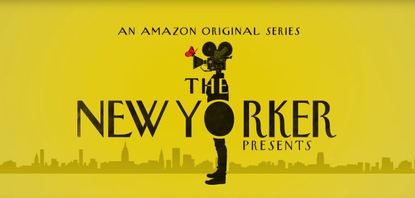Amazon's The New Yorker Presents, and the future of magazines as television
As the print industry continues to shrink, publications are falling back on the currency they have left


How do you turn a magazine into a TV series? On the surface, you could hardly get much closer than The New Yorker Presents, a new weekly Amazon series that tries for an almost alchemical purity in its efforts to make a video screen feel like a magazine page. The opening credits are an animated riff on the magazine's famous covers. From there, the series immediately cuts to a "table of contents," complete with headlines and bylines. It also includes the time at which each particular segment begins, in case you'd like to skip to a specific story like you'd flip to a page in a magazine. And — perhaps most unusually for a streaming-exclusive series — The New Yorker Presents is eschewing a binge model; the series will release one episode per week, in the TV equivalent of a magazine subscription. This is, so far, the only Amazon original that releases weekly.
The New Yorker Presents zigs where the rest of television is zagging. As audiences continue to fragment into smaller and smaller niches, this is the rare series that's unapologetically generalist. Like its namesake magazine, The New Yorker Presents curates a bunch of disconnected pieces of media — a documentary by Jonathan Demme, a short film starring Alan Cumming, a poem read by Andrew Garfield, a couple of very short cartoons — and squeezes them into a 30-minute package. It's easy to see why the series has amassed such a roster of talented contributors; The New Yorker name still carries weight and filmmakers who contribute to the TV series get to camp in the same tent.
What The New Yorker Presents doesn't echo — and can't, if it wants to maintain the high-gloss presentation of these initial episodes — is the magazine's timeliness. On a realistic production schedule, The New Yorker Presents can't be on the pulse of news cycle; the most topical segment is an adaptation of Adam Gopnik's "The Simple Truth About Gun Control," which was originally published in December 2012.
Subscribe to The Week
Escape your echo chamber. Get the facts behind the news, plus analysis from multiple perspectives.

Sign up for The Week's Free Newsletters
From our morning news briefing to a weekly Good News Newsletter, get the best of The Week delivered directly to your inbox.
From our morning news briefing to a weekly Good News Newsletter, get the best of The Week delivered directly to your inbox.
At a recent screening of the series, New Yorker editor David Remnick clarified that the magazine's role in the series is merely "advisory." Though the creative team behind the TV show has full access to The New Yorker's archives, there's not much cross-pollination. But Alex Gibney, who serves as executive producer on the series, told me that he's interested in exploring a closer relationship with the magazine; he floated the possibility of a New Yorker writer and a documentarian developing a story in collaboration in future seasons. He also thinks the series could reach a point at which a documentary segment could be shot, edited, and produced within a week, enabling the show to catch a news peg before it totally elapses.
But in the context of the entire print media landscape, The New Yorker Presents is just one example of a fascinating trend. We're well into the era when an actual print magazine has become a niche specialty product in the larger, more amorphous idea of a "publication." For a while, it seemed like traditional magazines might survive by following their readers online and shifting the focus to digital. As video came into vogue, publications hopped onboard with their own video content, but the results were often lackluster: poorly produced, auto-playing annoyances for stories that would probably have been better in text anyway.
But as it turns out magazines do have stories to tell in video — they're just better when you push them into the ongoing boom market of television, and make them in collaboration with people who actually understand this kind of storytelling. The key is ensuring that a TV series enhances a brand instead of diluting it. HBO's Vice TV series is the best and purest version of what the publication claims to do across all its channels: in-depth, on-the-ground reporting on events all over the world. The Esquire Network — which, like its affiliated magazine, aims to celebrate "man at his best" — is, as I write this story, in the middle of an eight-hour block of House reruns, which will be followed by three hours of Team Ninja Warrior. There's at least one more of these on the horizon; Showtime and Rolling Stone are in the early stages of developing a 30-minute docuseries that sounds suspiciously like HBO's Vice — except, you know, Rolling Stone.
Good or bad, you can sense the urgency behind these launches, as one-time print giants attempt to diversify their shrinking portfolios. "Legacy" publications are justly afraid of upstarts like Vice, BuzzFeed, and Vox, which have successfully built massive audiences in younger, more advertiser-friendly demographics. Next month, Vice will build on the success of its HBO series with an entire new network titled Viceland; BuzzFeed and Vox have each invested millions and millions of dollars in television, with the promise of similarly ambitious futures.
Where does that leave a publication like The New Yorker? The New Yorker Presents is essentially a prestige product for a prestige magazine, targeting a niche slice of a niche audience. The magazine's average reader is 50; the majority of Amazon Prime subscribers are between 40 and 49. It's worth noting that the idea for the series originated with Conde Nast, not Amazon. It's a feather in the cap for both, but it also seems unlikely to appeal to anyone but those who have already bought in to both.
And in that way, it's also a reminder that prestige is one of the only currencies publications have left to spend.
Sign up for Today's Best Articles in your inbox
A free daily email with the biggest news stories of the day – and the best features from TheWeek.com
Scott Meslow is the entertainment editor for TheWeek.com. He has written about film and television at publications including The Atlantic, POLITICO Magazine, and Vulture.
-
 Walter Isaacson's 'Elon Musk' can 'scarcely contain its subject'
Walter Isaacson's 'Elon Musk' can 'scarcely contain its subject'The latest biography on the elusive tech mogul is causing a stir among critics
By Theara Coleman Published
-
 Welcome to the new TheWeek.com!
Welcome to the new TheWeek.com!The Explainer Please allow us to reintroduce ourselves
By Jeva Lange Published
-
 The Oscars finale was a heartless disaster
The Oscars finale was a heartless disasterThe Explainer A calculated attempt at emotional manipulation goes very wrong
By Jeva Lange Last updated
-
 Most awkward awards show ever?
Most awkward awards show ever?The Explainer The best, worst, and most shocking moments from a chaotic Golden Globes
By Brendan Morrow Published
-
 The possible silver lining to the Warner Bros. deal
The possible silver lining to the Warner Bros. dealThe Explainer Could what's terrible for theaters be good for creators?
By Jeva Lange Last updated
-
 Jeffrey Wright is the new 'narrator voice'
Jeffrey Wright is the new 'narrator voice'The Explainer Move over, Sam Elliott and Morgan Freeman
By Jeva Lange Published
-
 This week's literary events are the biggest award shows of 2020
This week's literary events are the biggest award shows of 2020feature So long, Oscar. Hello, Booker.
By Jeva Lange Published
-
 What She Dies Tomorrow can teach us about our unshakable obsession with mortality
What She Dies Tomorrow can teach us about our unshakable obsession with mortalityThe Explainer This film isn't about the pandemic. But it can help viewers confront their fears about death.
By Jeva Lange Published


